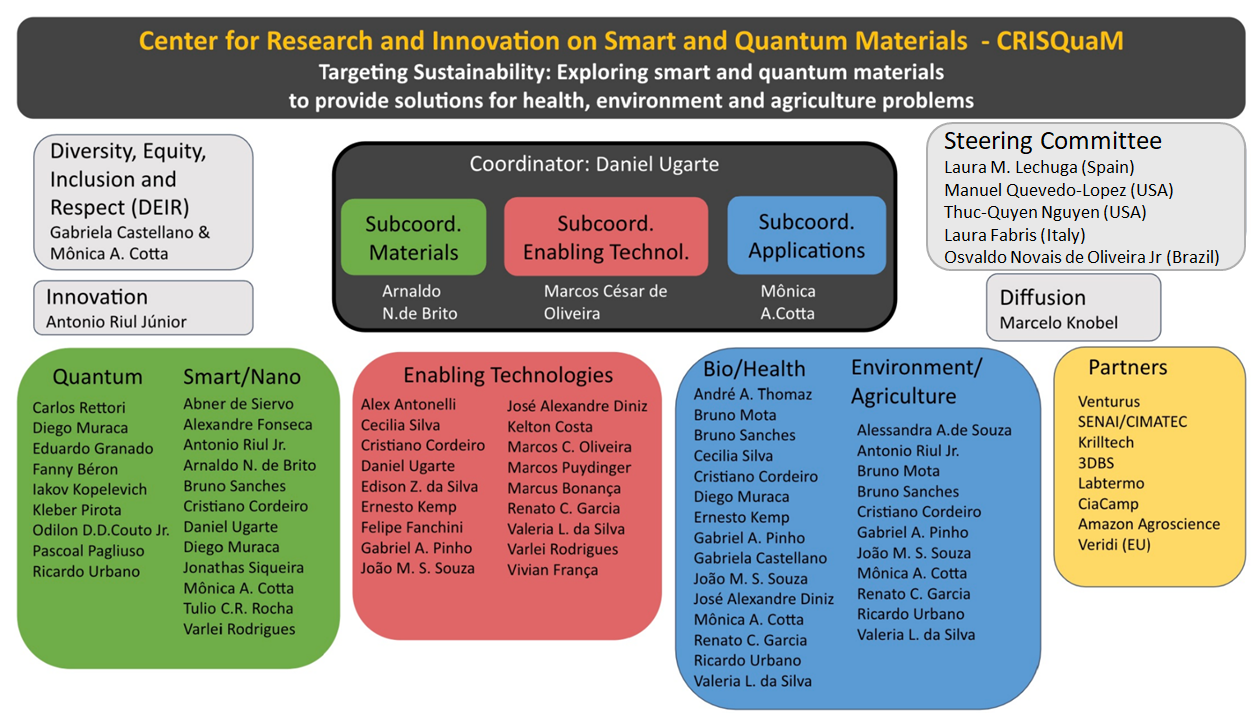BV-FAPESP: research projects supported in this Center
CRISQuaM in the Media: news about the center
CRISQuaM aims to explore the synergistic development of fundamental and applied science to create new materials with high potential for the construction of devices and sensors to address technological challenges related to sustainability, climate change, precision agriculture, ecology, and health. To achieve these goals, we have assembled an interdisciplinary and collaborative research team, integrating expertise across various scientific domains, researching novel materials with high innovation potential. By combining original synthesis methods, advanced characterization techniques, theoretical approaches, computational simulations, quantum technologies, and device construction designs, we aim to drive advances in smart and quantum materials, promoting scientific excellence and technological development. With this, we plan disruptive innovations in instrumentation—including hardware and AI-based tools—as well as in quantum technologies, biomedical devices, and signal processing, in addition to plant bionics, exploring plant-pathogen interactions. Besides research activities, we plan intensive actions in education, dissemination, and communication for the general public, as a modern society should be aware of the challenges humanity faces and how research and technology are essential for responsibly utilizing the planet's limited resources. CRISQuaM's Innovation activities are accelerated through partnerships with several companies in related technologies, many of them Brazilian. Finally, all activities of the Center are managed in accordance with diversity, equity, and inclusion goals and best practices.
The Center brings together scientists, engineers, and innovators in a collaborative effort to apply materials science and quantum technologies at the cutting edge, designing new materials and nano(bio)sensors for advanced diagnostics. The Center has a team capable of producing a wide range of (nano/micro) materials, along with precise chemical and physical characterizations using modern techniques (synchrotron, advanced microscopy, magnetotransport, magnetic resonance, optics, etc.). In addition, the team offers various options in enabling technologies, including miniaturization, processing, and additive manufacturing, as well as instrumentation, quantum sensing, and electronics development. Data analysis will employ updated approaches (numerical simulation, classical and quantum machine learning, and quantum optimization). Applications at the knowledge frontier will address urgent sustainability needs in environmental areas, precision agriculture, plant bionics, and biomedical interfaces, contributing to the development of local technologies in close partnership with the Brazilian industry.
The organization of the Center is based on three pillars — Materials, Enabling Technologies, and Applications — together with partner companies, as described in the figure below.

2023-07-12
Superflares release huge amounts of energy. If they occurred on our Sun, they would have a massive impact on Earth. The researchers studied two K-type stars and concluded that eruptions of this magnitude are due to their magnetic complexity.
2023-07-05
Contrary to the predominant view held since the eighteenth century, the French philosopher and physician saw the organism as a totality interacting with its environment rather than a mere aggregation of parts whose functioning depended only on the right amount of organic substances.
2023-07-05
A novel methodology used in the 24th edition of the PIPE High-Tech Entrepreneurial Training Program will guide 21 innovative startups in the process of developing customers and refining their business models, among other competencies.
2023-07-05
The discovery was made by researchers affiliated with institutions in Brazil and Chile. Their analysis of oral cells that expressed human papillomavirus proteins and were exposed to cigarette smoke pointed to an increase in levels of an enzyme associated with tumor progression and DNA damage.
2023-07-05
Trials involving mammalian cells were conducted by researchers in São Paulo state, Brazil. Although it endangers biodiversity along much of the coast, sun coral could be an ally in combating Chagas disease, which affects 7 million people worldwide and lacks effective treatment.